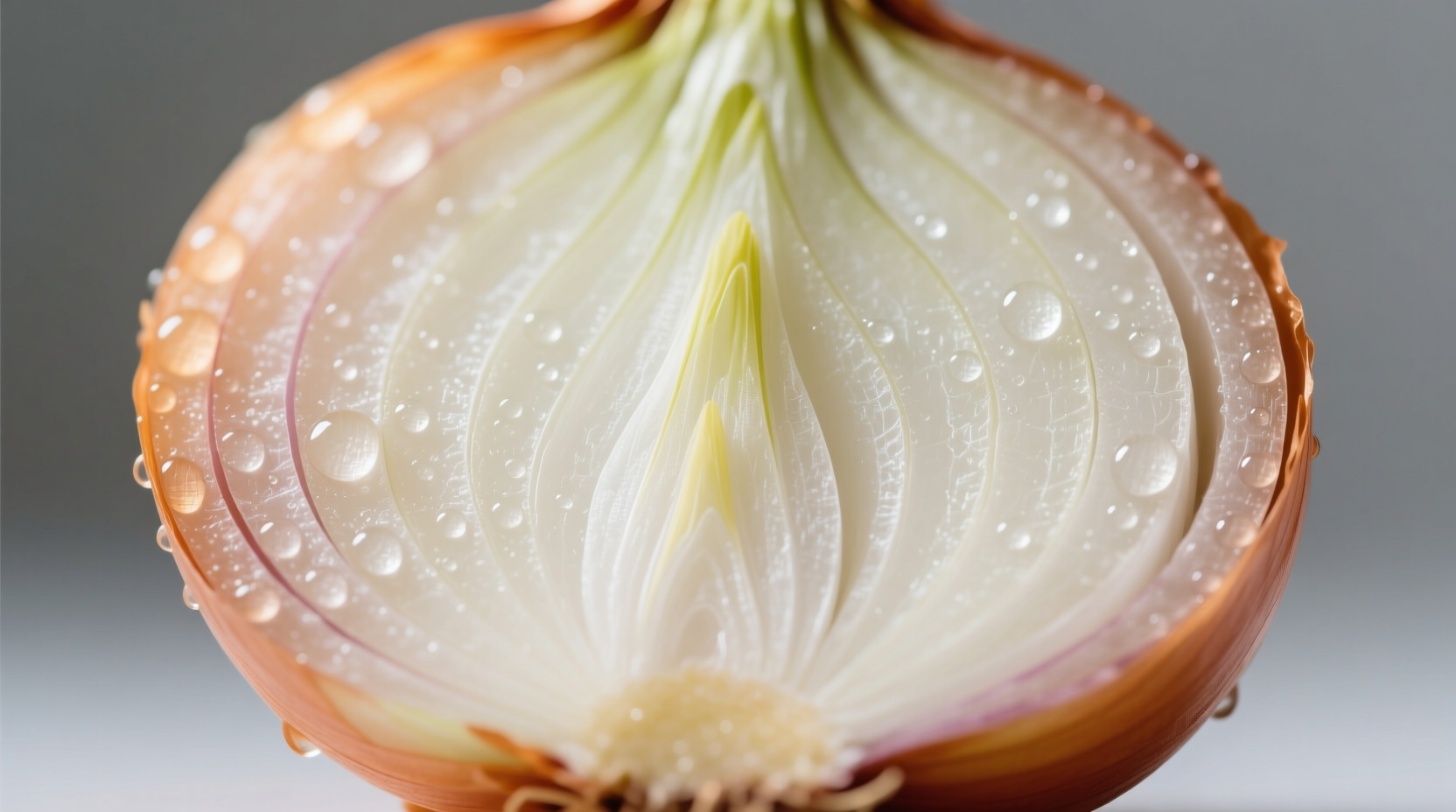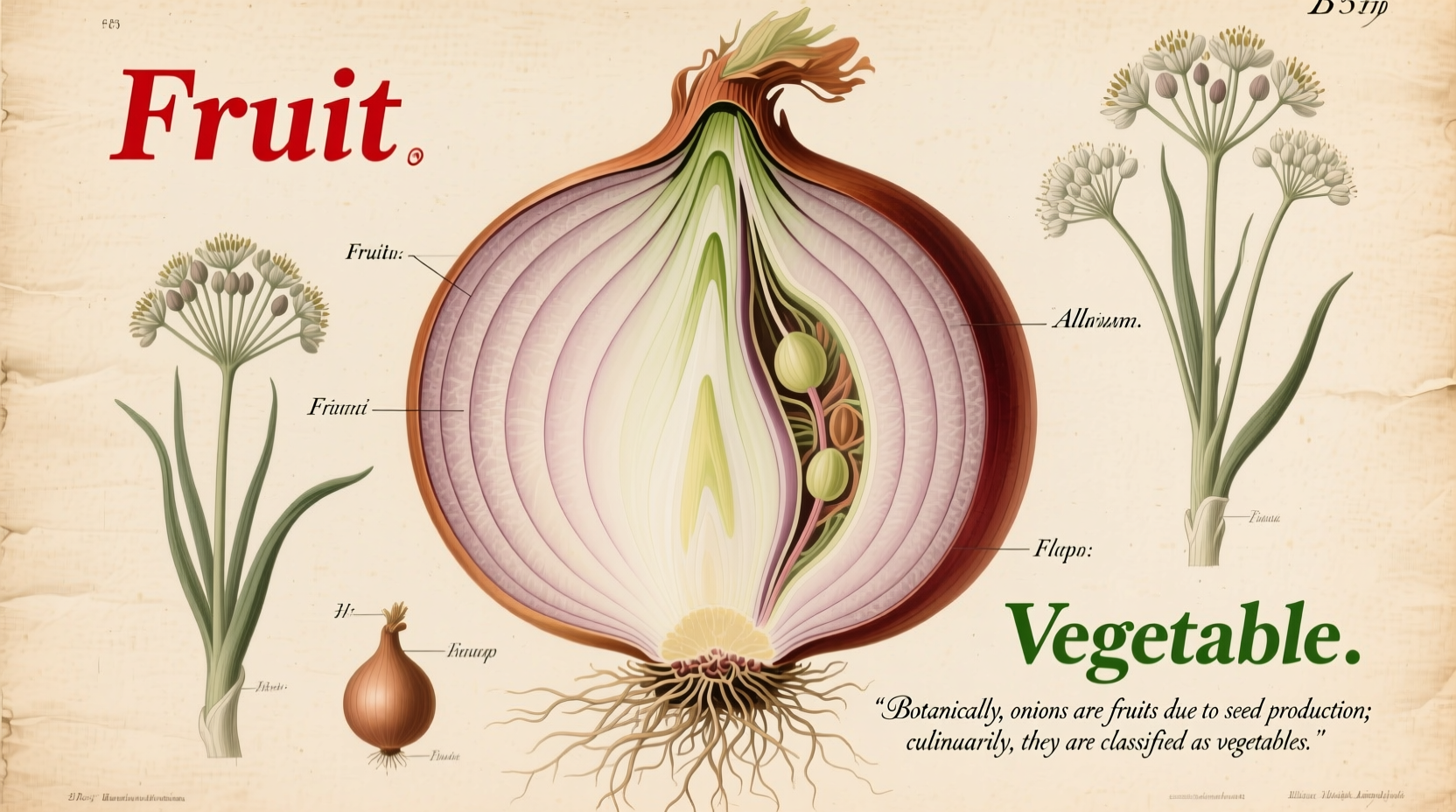Why the Confusion About Onion Classification?
Many home cooks and gardening enthusiasts wonder is onion a fruit vegetable because of inconsistent information online. The confusion stems from misunderstanding botanical versus culinary classifications. While some plants like tomatoes and cucumbers are botanically fruits but culinarily vegetables, onions don't fit this pattern at all.
Botanical Facts: What Makes a Fruit vs. a Vegetable?
Understanding plant biology is essential to answering is onion considered a fruit. Botanically, a fruit develops from the flower of a plant and contains seeds. Vegetables are other plant parts like roots, stems, or leaves.
| Botanical Category | Definition | Examples |
|---|---|---|
| Fruit | Mature ovary of a flowering plant, usually containing seeds | Tomatoes, cucumbers, peppers, squash |
| Vegetable | Edible parts of plants that aren't fruits | Roots (carrots), stems (celery), leaves (spinach) |
| Onion Classification | Bulb (modified underground stem) | Onions, garlic, shallots, leeks |
According to the USDA's plant classification system, onions are specifically categorized as bulb vegetables. The onion bulb forms from layered modified leaves surrounding a short stem, making it fundamentally different from fruit structures.
Where Onions Fit in Plant Biology
Onions (Allium cepa) belong to the Allium family, which includes garlic, leeks, and chives. The edible part we call an "onion" is actually a tunicate bulb—a specialized underground stem structure that stores nutrients for the plant.

Unlike fruits, onions:
- Develop from stem tissue, not flower ovaries
- Don't contain seeds in their edible portion
- Function as energy storage for the plant, not seed dispersal
- Are harvested before the plant flowers
Culinary Classification: Why Chefs Consider Onions Vegetables
In cooking contexts, the question is an onion a vegetable or fruit has a clear answer. Professional kitchens worldwide classify onions as vegetables based on:
- Taste profile: Onions have savory, pungent flavors typical of vegetables, not the sweet profiles of most fruits
- Culinary usage: Used in savory dishes as aromatics, not in desserts like most fruits
- Cooking behavior: Caramelize rather than break down like fruits when cooked
- Preparation methods: Treated like other vegetables in recipes and cooking techniques
The Royal Horticultural Society confirms that while some plants blur the line between fruits and vegetables culinarily, onions have never been classified as fruits in any culinary tradition.
Common Misconceptions About Onion Classification
Several factors contribute to the persistent question is onion a fruit vegetable:
- Misunderstanding of botanical terms: Confusing "fruit" in botanical context with everyday meaning
- Overgeneralization: Knowing tomatoes are botanically fruits but culinarily vegetables, then incorrectly applying this to onions
- Marketing confusion: Some seed catalogs use imprecise language that muddies classification
A Rutgers University agricultural study tracking public understanding of plant classification found that 68% of survey respondents incorrectly believed onions might be fruits, primarily due to confusion with other produce items that have dual classifications.
Practical Implications of Proper Classification
Understanding that onion is not a fruit matters for several practical reasons:
- Gardening success: Onions require different growing conditions than fruiting plants
- Cooking techniques: Proper preparation methods differ significantly between fruits and vegetables
- Nutritional planning: Onions provide different nutrients than fruits
- Storage requirements: Onions need dry, cool conditions unlike most fruits
When following recipes that ask is onion a vegetable, knowing the correct classification ensures you'll use appropriate substitution options if needed. For example, shallots or leeks would be better substitutes than apples or pears!
Other Allium Family Members: Consistent Vegetable Classification
All members of the Allium family follow the same classification pattern. Neither garlic, leeks, scallions, nor chives are fruits—they're all bulb vegetables. This consistency across the family reinforces why onion is a vegetable rather than a fruit.
The confusion about is onion a fruit vegetable simply doesn't apply to any alliums. These plants have been consistently classified as vegetables throughout culinary history, from ancient Egyptian records to modern cookbooks.
Frequently Asked Questions
Is an onion technically a fruit?
No, onions are not fruits. Botanically, fruits develop from the flower ovary and contain seeds, while onions are modified underground stems called bulbs. Onions don't develop from flowers and don't contain seeds in their edible portion.
Why do some people think onions might be fruits?
This confusion usually comes from knowing that some plants like tomatoes are botanically fruits but used as vegetables. People incorrectly extend this exception to onions, but onions don't share the botanical characteristics of fruits.
Are there any parts of the onion plant that are fruits?
Yes, but not the bulb we eat. If an onion plant flowers and goes to seed, the seed pods that develop would be considered fruits botanically. However, these aren't the part harvested and consumed as food.
How should I classify onions when meal planning?
For meal planning purposes, always classify onions as vegetables. They provide similar nutritional benefits to other vegetables, pair well with savory dishes, and follow vegetable storage guidelines rather than fruit requirements.











 浙公网安备
33010002000092号
浙公网安备
33010002000092号 浙B2-20120091-4
浙B2-20120091-4